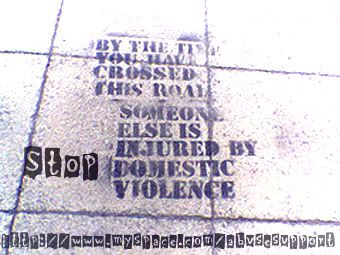
IT CAN HAPPEN TO ANYONE
Domestic violence is a serious problem that has been happening for centuries. In the U.S. each year it affects millions of people, most often women. Domestic violence can happen to anyone regardless of employment or educational level, race or ethnic background, religion, marital status, physical ability, age, or sexual orientation.
IT IS NOT YOUR FAULT
If you are being abused by your partner, you may feel confused, afraid, angry and/or trapped. All of these emotions are normal responses to abuse. You may also blame yourself for what is happening. But no matter what others might say, you are never responsible for your partner's abusive actions. Batterers choose to be abusive. No one deserves to be abused.
IDENTIFYING SUPPORT
Developing a support network can be very helpful to you as you plan for safety. There are many places to turn for assistance.
COMMUNITY SUPPORT: Friends, family, women's and community groups, churches, and service providers (such as legal, health, counseling centers) can provide a variety of resources, support, and assistance.
DOMESTIC VIOLENCE SERVICES: In man communities there are organizations that provide free and confidential help to individuals who are being battered.
LEGAL OPTIONS
CRIMINAL CHARGES: If you or other loved ones have been physically injured, threatened, raped, harassed or stalked, you can report these crimes to the police. Criminal charges may lead to your abuser being arrested and possibly imprisoned.
RESTRAINING/PROTECTIVE ORDERS: Even if you don't want to press criminal charges, you can file for a civil court order that directs your partner to stay away from you. In many states restraining/ protective orders can also evict your partner from your home, grant support or child custody, or ban him/her from having weapons.
PLANNING FOR SAFETY
Without help, domestic violence often continues to get more severe over time. It can sometimes become deadly.
To increase your safety:
~ Tell others you trust such as friends, family, neighbors and co-workers, what is happening and talk about ways they might be able to help.
~ Memorize emergency numbers for the local police (such as 911), support persons and crisis hotlines.
~ Identify escape routes and places to go if you need to flee from an unsafe situation quickly.
~ Talk with your children about what they should do if a violent incident occurs or if the are afraid.
~ Put together an emergency bag with money/ checkbooks, extra car keys, medicine, and important papers such as birth certificates, social security cards, immigration documents, and medical cards. Keep it somewhere safe and accessible, such as with a trusted friend.
~ Trust your instincts. If you think you are in immediate danger, you probably are. Get to a safe place as soon as you can.




No comments:
Post a Comment